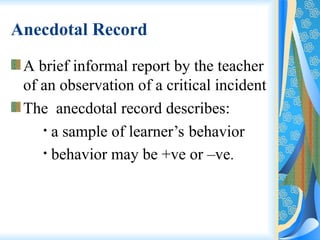Anecdotal Record- Communicative English.ppt
- 1. Visanth V S Asso.Professor College of Nursing, MVASMC, Basti ANECDOTAL RECARD FOR SSA Anecdotal Record
- 2. Anecdotal Record A brief informal report by the teacher of an observation of a critical incident The anecdotal record describes: ŌĆó a sample of learnerŌĆÖs behavior ŌĆó behavior may be +ve or ŌĆōve.
- 3. Definitions It is the written description of a specific incident of which a teacher has observed.
- 4. Purposes Of Keeping Anecdotal Record To know studentŌĆÖs interest To know changes in attitudes To provide evidence of progress of learning To describe social adjustment To mention clearly the situations which provoke anti social behavior.
- 5. Contents of an anecdotal record Name of the student, class, school, date and time. Description of an incident Interpretation of the behaviour, recommendation concerning to that behaviour. Signature of observer. Signature of the student.
- 6. Guidelines of Anecdotal Record All the entries should include the date, time, activity and the specific event. It is important to keep and maintain the objectivity. Teacher need to keep emotional comments and subjective comments out of the report (should be written separately). This is a confidential record of one student.
- 7. ContdŌĆ”. It should not include the name of the other student. The record should be kept in chronological order. Avoid using generalization such as ŌĆ£always fightingŌĆØ or: never preparedŌĆØ. It is advisable to keep a notebook or an anecdotal form handy in order to make a note about the incident.
- 8. Qualities Of Good Anecdotal Record Objective Specific Full view Background information Selective information
- 9. Advantages Of Anecdotal Record Directing attention to individual pupils Continuous records useful in self appraisal Helpful in improving pupil counselor relationship Formation of better work & study habits Improving curriculum construction Useful in clinical service
- 10. Limitations Of Anecdotal Record Subjective Heavy student load Difficult to organize & summarize Difficult to interpret More anecdotes of undesirable behavior
- 11. Sample Format of Anecdotal
- 12. Thank You












